


This program contains graphic imagery.
Two years ago, President Bush announced his exit strategy for the U.S. military in Iraq. It was a plan critically dependent upon training Iraqi security forces. "Our strategy can be summed up this way," said the president. "As Iraqis stand up, we will stand down."
But despite a four-year training effort -- costing $15 billion and producing more than 300,000 Iraqi soldiers and national police -- the violence in Iraq has only intensified. (more »)
ONE
A Constant Struggle
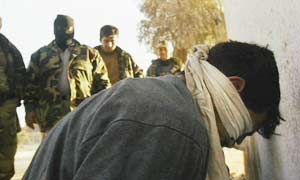

Training Iraqi Police and Army
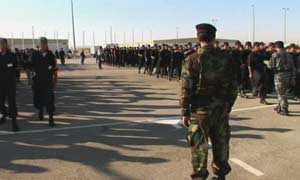

THREE
Revamping the Training
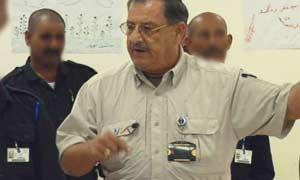

A New Shi'ite-Dominated Government
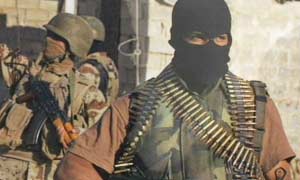

FIVE
A Starting Point for the Civil War
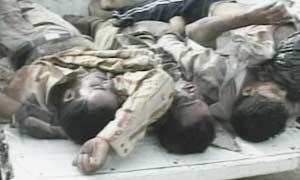

Militia Infiltration/An Eye-Opening Moment
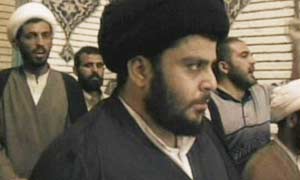

SEVEN
2007 - A New Strategy
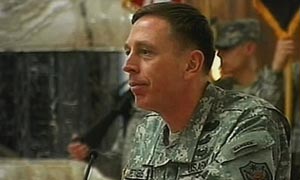

The film begins with a dramatic example of the escalating sectarian strife facing Iraqi police and soldiers. In Baghdad, where 15 to 30 bodies show up on the streets each day, Smith is with U.S. soldiers at a police station in Adhamiyah -- a community with a Sunni majority -- when Sunni insurgents strike nearby Shi'ite Sadr City, killing over 200 Shi'a. It was the deadliest sectarian attack of the war. (See Map.) To avenge the attack, mortars from Sadr City start flying into Adhamiyah. On that day, Iraq's police were powerless to stop the sectarian killing.
In addition to sectarian bloodshed, one of the chief problems American trainers are working hard to address is the divided loyalties within the Shi'ite-dominated police and army where Iraqis are loyal not so much to the Iraqi state, but to sheikhs or clerics -- in particular, the powerful rival clerics Moqtada al-Sadr, who has his own 60,000-man militia, the Mahdi Army, and Abdul Aziz al-Hakim, leader of the Shi'ite SCIRI Party and its armed wing, the Badr Brigade.
Smith goes on a joint U.S.-Iraqi raid on a weapons cache belonging to Mahdi Army. The soldiers recovered heavy munitions. The Americans celebrated the raid as a great success. But then FRONTLINE's cameraman caught some Iraqis soldiers having a discussion about another, larger cache of weapons that is "with the sheikh" -- information they never shared with the Americans.
Gangs of Iraq tracks the struggle to create a loyal and national Iraqi force from the earliest months following the invasion. In the fall of 2003, L. Paul Bremer, head of the American occupation government, opened a training center in Jordan. Thousands of recruits from all over Iraq were flown in, equipped and given an eight-week crash course. The ranks of the police and army quickly swelled.
But soon it came time to fight. In April 2004, the militant anti-American Moqtada al-Sadr mounted his first uprising and the new security forces collapsed. The performance of the police was particularly abysmal, as many newly-outfitted officers changed sides and joined the Sadr's militia, the Mahdi Army. The film includes footage of the police in the streets celebrating next to Sadr's militiamen.
The first national elections, in January 2005, only fueled the sectarian dynamic. It brought to power an alliance of Shi'a religious parties which moved quickly to secure control of the Sunni-headed Ministry of the Interior. The ministry, in charge of all of Iraq's police, includes the elite units known as the Commandos. The ministry's new head, Bayan Jabr, a top deputy to Shi'ite cleric al-Hakim, began re-staffing commando units with commanders in Badr Corps, the militia loyal to Hakim. Soon, many bodies -- many of them of Sunni civilians -- started turning up on the streets.
Allegations of death squads, secret torture centers and infiltration by militia forces were leveled at the Ministry of Interior. In a revealing interview with Jabr, Smith confronts the former minister with the charges. Jabr vigorously defends his record, but then concedes that abuses have taken place. "I cannot correct the ex-officers of Saddam which work with us," Jabr says. "There is a culture."
It remains to be seen if the American trainers can build a truly national Iraqi police and army, or if these new forces are merely fueling the sectarian conflict. "We have been going about pumping out so many individuals, with weapons, with uniforms," says Matt Sherman, a former adviser to the Ministry of Interior. "My greatest fear is that in our effort to train and equip the Iraq security forces, what we've been doing is equipping Iraqis for civil war."






